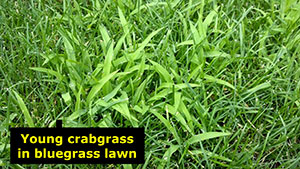Weedy grasses can give lawns an unsightly appearance. The difference in growth, color and texture of weedy grasses may give an otherwise neat lawn an unkempt look. Grasses such as crabgrass, foxtail and quackgrass are often a problem and are difficult to eliminate in lawns.
What is the best way to control weeds in my lawn?

The best way to control weeds in your lawn is to maintain a dense, healthy, vigorous stand of lawn grass. Good practices of seeding, mowing, watering, fertilizing and judicious use of herbicides, can help achieve a healthy lawn. To keep weeds from becoming established, avoid frequent, shallow watering and mowing too short, which decreases the vigor of the lawn.
What is most important in weed control?
The most important part of any effective weed control program is identification of the weed, which will help determine whether the weedy grass is an annual or perennial.
Do herbicides work well in weed prevention?
Herbicides affect both lawn and weedy grasses similarly. Roundup® is an effective grass killer, although it will kill both lawn and weed grasses. It can be used to spot-spray individual patches of undesirable grasses. Pre-emergent herbicides prevent weed seed germination and control crabgrass. In most parts of Colorado, apply these herbicides between April first and fifteenth, before seeds germinate. Eliminating weedy grasses in established lawns can be difficult. Hand pulling or digging after moistening the soil may be the most practical method.
Renovating a lawn severely infested with perennial grass weeds can begin by spraying the entire lawn with Roundup®. About three to four weeks later, work the area by plowing or tilling, then either seed or sod.
For more information, see the following Colorado State University Extension fact sheet(s).
For more information, see the following Planttalk Colorado™ script(s).



